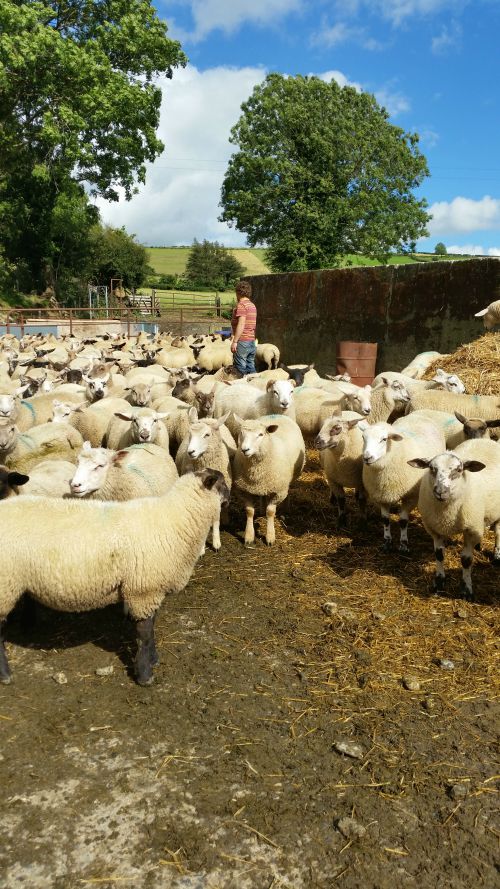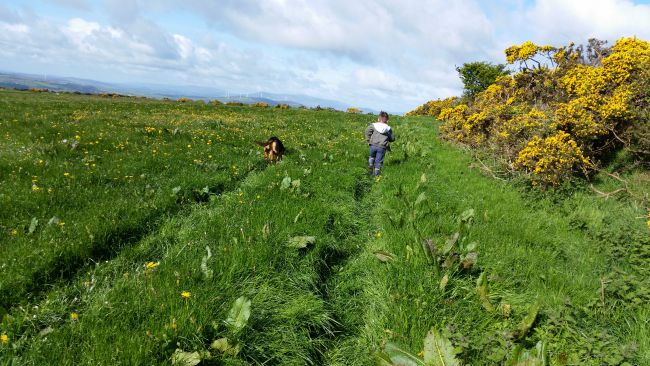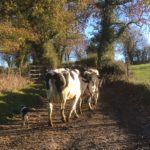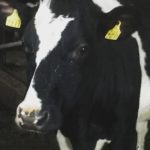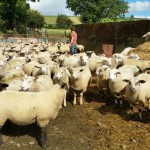
I met Leonie on Twitter where we first shared a chat comparing sheep and dairy farming I think. I was intrigued to discover that she didn’t have a farming background and yet, is now farming full-time as a sheep farmer. The journey from city life to spending hours in a lambing shed is an interesting one so I was delighted to interview about her life and times. I hope you enjoy the read too.
1.Hi Leonie, tell me a little about yourself and your family. Do you have a farming background?
I’m originally from Dublin with an older brother based in the US and a younger brother based in Amsterdam. My Dad was a consultant surgeon and my mother a nurse.I had a pretty sheltered upbringing in south county Dublin, and went to a nice ‘convent’ school. I suppose I was very much the urbanite. In my teenage years I could walk to the city centre in about 40 minutes.I am absolutely not from a farming background!
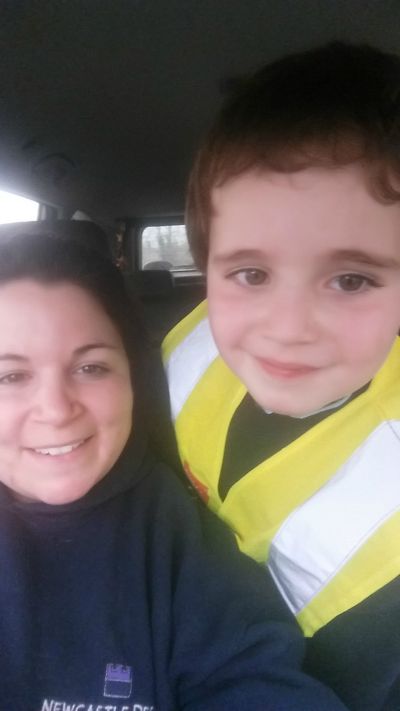 While I would have said from an early age that I wanted to ‘work with animals’, veterinary would have been the only channel I would have been aware of that could allow me to do this. Farming would never have crossed my mind!
While I would have said from an early age that I wanted to ‘work with animals’, veterinary would have been the only channel I would have been aware of that could allow me to do this. Farming would never have crossed my mind!
I am now 35 and based in Carnew, Co. Wicklow in the heart of farming country, surrounded by rolling pastures of cows and sheep. I am married with a son aged 5 who is proving to be quite a handful, especially now that he is on his summer holidays!
2. Where are you located and what kind of farming do you do?
We’re based on the border between south Wicklow and north Wexford. We run about 300 sheep: a flock with Suffolk and Charlois mainly. Since starting farming in about 2010, we are still growing our numbers and are hoping to get up to about 350 ewes in the next year.
3. What work do you do on the farm now?
Up until Christmas of last year, I was working full time and I admit, my contact with the farm was very limited. I was away from home from 8am until 6pm Monday to Friday as I was based in Rathnew. By the time I was home at the weekend, I was madly scrambling about trying to deal with laundry, housework and giving Luke (our son) as much time as possible. The farm really didn’t fit into my schedule.
Since Christmas, I have been the full-time farmer, doing the day to day errands that are required: feeding, watering, moving, checking them all and at the moment, trying to keep the weanlings contained where they are supposed to be! We save the bigger chores like dosing, footbathing and the like for the weekends when my husband is around.
4. Do you think your role in doing most of the farming is unusual amongst farm women?
I think it is more usual than any of us think.
I think that farming in Ireland is seen predominantly as ‘A Man’s Game’. However, I think that women who take on roles in the farm are often living in their husband’s shadow as ‘the farmer’s wife’. With farming, it really involves the whole family but often it is only ‘the farmer’ himself who gets the credit.
And of course we all know that women are better at juggling our different roles and multi-tasking!
5. Is your husband the registered farmer? Why did you decide that you, rather than he, would farm full-time?
Yes, my husband is a registered farmer. I am not and have no training aside from what I have learned in the field (literally sometimes).
My husband has been farming full time since 2010. He completed the ‘Green Cert’ and took over the family farm. His family had not been farming for at least 10 years previously so he had to start from scratch, buying in stock, repairing fences, sheds etc. He returned to full time work in September last.
With both of us being gone all week mid-week, we relied heavily on family based around us and the patience and good-will of neighbours. My husband and I were hardly about Monday – Friday and were barely seeing Luke (our son), let alone doing the sheep duties. We knew it was time to make a change. In our position, it was more profitable for him to be working full time than for me, so after Christmas, I became the Stay-at-Home Mom and Farmer.
All I can say is that January was a gruelling month. I have no idea how I survived it – my body was totally in shock at the amount of hard physical labour I had to do!
6. What are the advantages for you as a family?
For me, the fact that I am at home is huge. I brought my son to school (Junior Infants) on?5th January?and collected him. It was my second time bringing him to school, my first time collecting him and my first time doing his homework with him. It has been a joy to spend time with him and watch his progress as he learns to read and do his numbers. I could not have imagined doing that while I was working full time.
It is less of a worry for my husband as I am there to keep an eye on things when he cannot.
I am better able to keep control of the housekeeping. My stress levels are greatly reduced and I am feeling healthier than I have in years. Lots of outdoors work means that I have a lovely glowing tan, instead of looking pasty and pale as I usually do from being cooped up in an office all day, and I am fitter too. On a quiet day, I’m covering an average of 10km (thank-you FitBit!).
I had great ideas when I started that I would have some more time ‘for me’ but this hasn’t really happened yet!
We live next to my husband’s parents, his older brother and his sister and their families, so it is wonderful to see them all more regularly (sometimes daily). They have also been of invaluable help, minding Luke when necessary, standing in ditches or on roads when moving sheep etc. They obviously have the farming background that I do not!
7. Do you think farm women are under-represented in the media and in farming organisations?
I think that they are, but it is up to us women to make our voices heard.
At the moment, I am hearing a bit of a rumble about women in farming from different places and I welcome that, but as I said earlier, I think that there is a tendency for women to ‘just get on with it’ and not want to ‘rock the boat’. Their husband or partner is the farmer while they fade into the background, while in actual fact they are sharing the load of the stress, labour and long hours in equal measure.
I am proud to be a woman farmer… even if I don’t really know what I am doing yet!
8. Do you think your type of farming is suited to women? (eg. would dairy be a good option for women farmers)
I think so, yes. Sheep are smaller and more manageable than cows. I have no experience with anything other than sheep though, so I am probably biased!? The rams (we have 8 of them) are a little big for me to handle, but the rest I can manage. My husband shears sheep but I don’t.
During lambing season, my husband took some time off work, which meant that I wasn’t flying solo, thank god! With both of us at home, it meant that nighttime visits to the shed to check our expectant mums was easy as we took it in turns, but his parents who live just beside us helped out too.
9. Do you have any advice or tips for women considering farming full time.
Go for it!
If I had known before I had started how physically, mentally and emotionally exhausting it would be, I probably would not have considered it. However, six months on, I am thrilled with my progress and proud that I have risen to the challenge. Farming is undeniably hard work but definitely worth it.
Organisation is key: making dinners ahead and freezing, keeping up to date with other household chores and laundry will help with the day to day running of the home. Keep the farming paperwork, invoices, dockets, prescriptions filed and easily accessible and up to date, otherwise time that you don’t have can easily be wasted.
Try and think ahead and not leave things to the last minute. If you can be prepared for things before they happen it can save hours. Also remember, animals are unpredictable: just this morning I had to spend about 2 hours rounding up lambs who had escaped from the field where they were supposed to be and then afterwards, I had to mend fences and block up holes in ditches that they had escaped through. Properly maintained fences would have saved this agony.
Lambing this year was made easier because we had a good set-up in our principal lambing shed: a fridge for medicines and lambs milk, hot running water, lots of snacks, drinks etc. Consider what you will need to make your life easier and it will make busy times easier to withstand. If you need more fencing wire, get some so it is ready if you need it in a hurry instead of having to make do with pulling branches off trees to plug holes in ditches!
Lastly, if you are working full time on a farm, try and find yourself a social outlet. A lot of time talking to animals and to yourself can make your social skills wane pretty quickly!
10. How do you describe yourself if someone asks you what you do?
I’m still struggling with this one, I always have to think. Usually what I come up is something like: ‘Eh well, I farm. I’m a farmer I suppose.’ I absolutely refuse to identify myself by my husband profession so I will never call myself a ‘farmer’s wife’.
11.?What helped you the most in the adjustment to farming?
Having my mother- and father-in-law very close by, along with a number of neighbours who would pop by ‘to see how things were going’ was immensely helpful. Also, even now, the rest of my husband’s family are wonderful.
At the beginning, the biggest adjustment was the physical work load. I had to work through this myself, but the right person dropping in at the right time with a few words of encouragement really kept me going.
And of course, those few words from my husband now and again, telling me I was doing an ‘ok’ job: I really clung to those! He was patient with me but he pushed me to do things I hadn’t done before: difficult deliveries, prolapses and even one episiotomy!
12. What hindered most / what was the most difficult thing to learn or adjust to??
As before, my overall lack of fitness and body condition made the first couple of months particularly exhausting. Added to that, hungry sheep who ended up giving me all sorts of bruises at feeding time and welts from using a fork for the silage. Up until March I was pretty much black, blue and exhausted the whole time. Sheer force of will got me through!
Thank you Leonie, it’s great to see women so enthusiastic about their full-time role in farming, particularly when you had no farming experience whatsoever. Readers if you would like to follow Leonie on Twitter, she’s at @LeonieVella and if you’d like to read more interviews with female farmers, check out my recent one with Maria Phelan.
?






